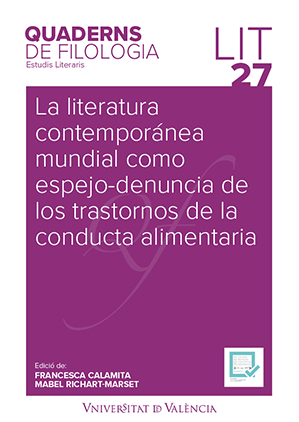Eating disorders as survival tools in Roxane Gay’s Hunger, A Memoir of (My) Body
DOI:
https://doi.org/10.7203/qdfed.27.25741Keywords:
body, eating disorders, trauma, abuse, female identity, fat phobia Abstract
Abstract
Women have historically been subject to dominant patriarchal discourses that have contributed to the exercise of power, violence, and control over their bodies. This work aims to show through the analysis of the autobiographical memory Hunger: Memories of my body by Roxane Gay how food and eating disorders symbolize a survival tool against cultural hegemony since they enable the creation of a symbolic language through which women can express their rejection of an oppressive system while externalizing the experience of traumatic experiences. This work presents eating disorders as an instrument of rebellion, protest and resistance with which women can face the discrimination and oppression present in the patriarchal system, but at the same time insists on the importance of finding an alternative language of their own, far from of eating disorders as they have very serious physical and emotional consequences.
 Downloads
Downloads
Downloads
Published
How to Cite
-
Abstract562
-
PDF (Español)622
Issue
Section
License
 Este obra está bajo una licencia de Creative Commons Reconocimiento-NoComercial-SinObraDerivada 4.0 Internacional.
Este obra está bajo una licencia de Creative Commons Reconocimiento-NoComercial-SinObraDerivada 4.0 Internacional.
Authors who publish with this journal agree to the following terms:
- Authors retain copyright and grant the journal right of first publication with the work simultaneously licensed under a Creative Commons Attribution License that allows others to share the work with an acknowledgement of the work's authorship and initial publication in this journal.
- Authors are able to enter into separate, additional contractual arrangements for the non-exclusive distribution of the journal's published version of the work (e.g., post it to an institutional repository or publish it in a book), with an acknowledgement of its initial publication in this journal.
- Authors are permitted and encouraged to post their work online (e.g., in institutional repositories or on their website) prior to and during the submission process, as it can lead to productive exchanges, as well as earlier and greater citation of published work (See The Effect of Open Access).




